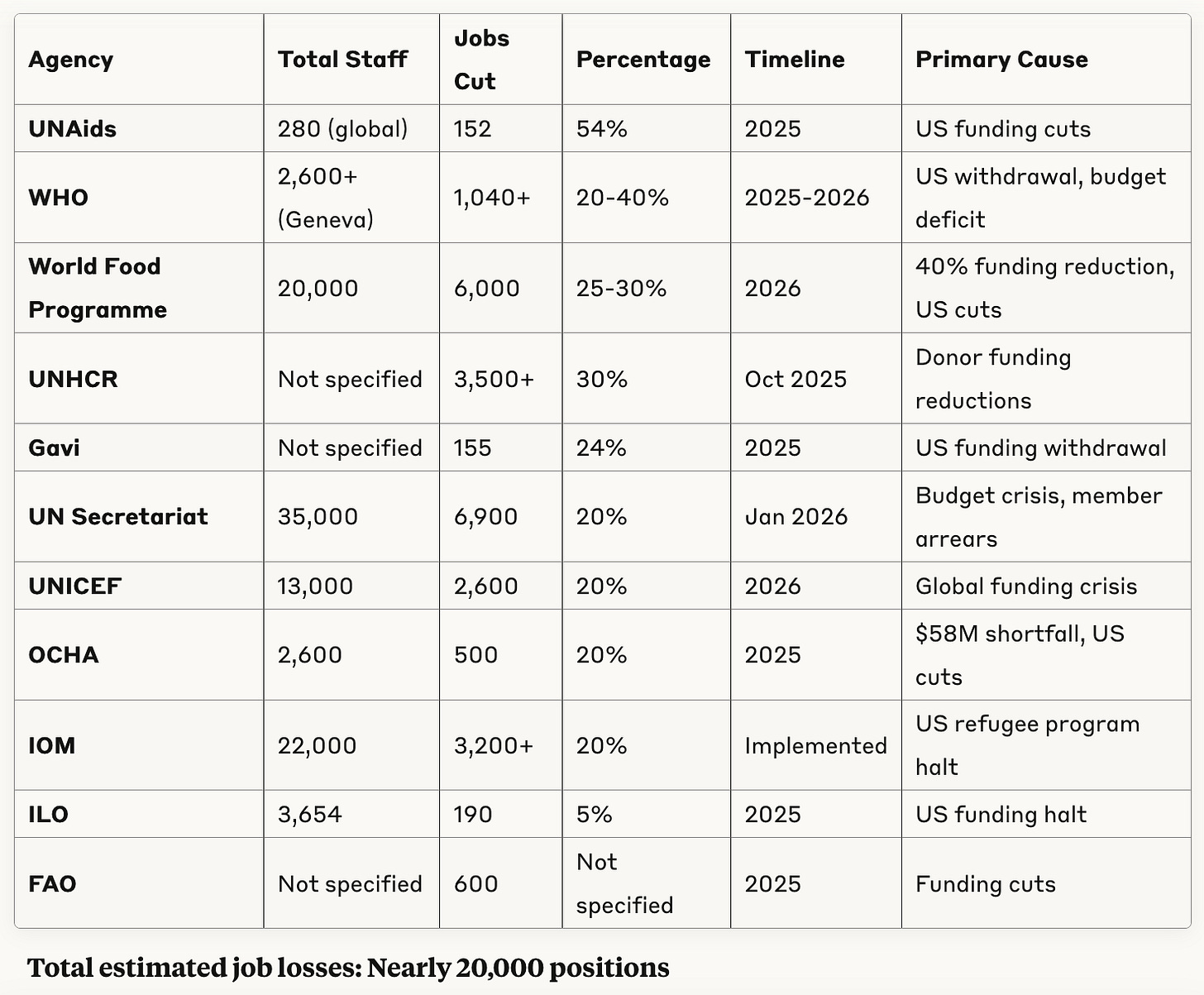The UN System Is Collapsing and Taking Careers With It
Expect over 20,000 job losses across the UN system with most layoffs happening in Geneva
The United Nations is experiencing the most catastrophic workforce contraction in its modern history under the auspices of UN80. What started as an efficieny drive has turned into tens of thousands of humanitarian professionals losing their livelihoods while global crises reach unprecedented levels.
We're not talking about modest budget adjustments or strategic realignments. This is a fundamental restructuring of the global humanitarian architecture at precisely the moment when climate change, conflicts, and economic instability are creating unprecedented need.
The UN system is getting gutted.
The Numbers Don't Lie
This US administration's systematic dismantling of foreign aid, combined with member state payment delays and donor fatigue, has created a perfect storm.
The United States currently owes approximately $1.5 billion in arrears for both past dues and the current fiscal year, while this administration's systematic cuts to foreign aid have eliminated hundreds of millions of dollars in discretionary funding and forced the abrupt termination of dozens of humanitarian programs.
Total estimated job losses: Nearly 20,000 positions. Here's the unemployment reality broken down by agency, ranked by severity of cuts:
What's Driving This Disaster
The funding crisis has three main culprits:
US Political Shifts: The United States, which typically contributes nearly 22% of the UN's regular budget, currently owes approximately $1.5 billion in arrears. This has been exacerbated by this administration's systematic cuts to foreign aid.
Member State Payment Delays: While 152 of the UN's 193 member nations paid their dues in full last year, 41 countries failed to meet their financial obligations. China, despite being the second-largest global economy, has historically made late payments, creating additional liquidity challenges.
Donor Fatigue: Voluntary contributions to humanitarian agencies are plummeting. The World Food Programme received $9.75 billion in contributions in 2024 with the US providing 46% of its budget, but is facing a projected 40% reduction in funding for 2025.
Conflicting US Politics
The influential (and very conservative) American Enterprise Institute assessed different UN organizations. It found that the United Nations and the World Food Programme contribute significantly to US interests—whether security, foreign policy, or economic.
They want this administration to continue membership, engagement, and financial support to better target US priorities. However, this desire is not held by Jeffrey Bartos of Pennsylvania.
Mr. Bartos was nominated to be the US representative for 5th Committee issues, where UN 80 will play out. He criticizes inefficiency and duplication in the UN system and calls for greater financial discipline and burden-sharing.
As he puts it: “American taxpayer dollars going to the UN should advance our national interest and contribute to making our country safer, stronger, and more prosperous.”
The Geneva Canton Bloodbath
Geneva, the humanitarian capital of the world, is getting hit particularly hard.
UNAids is reducing its Geneva head office staff from 127 to just 19 employees as part of a sweeping restructuring plan. Gavi eliminated 155 full-time positions at its headquarters just ahead of its major pledging conference, where the US announced it was pulling its $300 million annual funding.
The human cost is staggering. More than 1,200 people registered to attend a support session organized by the International Geneva Welcome Centre - a number that speaks volumes about the level of panic among international staff.
The Canton of Geneva has responded to the crisis by announcing a CHF 50 million foundation to help struggling international organizations adapt to the new funding environment.
An additional CHF 10 million grant has been launched to help NGOs retain staff, representing an unprecedented intervention by a host government to support international organizations.
What This Means for UN Careers
What began as a cautious response to funding uncertainties has evolved into a comprehensive restructuring affecting virtually every major UN agency. The staffing reductions have accelerated significantly since the initial announcements in spring 2025.
The Geneva Solutions report from July 2025 reveals that International Geneva alone is experiencing layoffs affecting over 30,000 employees, representing the most significant workforce reduction in the international organization sector's modern history
If you're in the humanitarian sector, here's your reality check:
Current UN Staff: Start job hunting immediately. A Devex analysis of UN positions posted on its own jobs platform revealed a 43 percent drop in hiring compared to last year. The market is about to be flooded with thousands of experienced professionals competing for fewer positions.
Aspiring Humanitarians: The traditional pathway through UN agencies just got nuked. You need alternative strategies immediately.
Mid-Career Professionals: Your institutional knowledge might be valuable to NGOs and consulting firms serving the humanitarian sector, but you're competing with thousands of others with the same experience.
The UN80 initiative, launched by Secretary-General António Guterres in March 2025, has become the framework for system-wide downsizing rather than the efficiency reform originally envisioned.
By July 2025, no UN office or agency has been exempted from staff layoffs, with the restructuring affecting operations from New York headquarters to field offices in the most remote locations.






